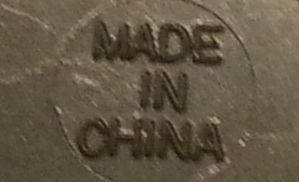 Antifreeze in toothpaste, poisoned pet food, lead in millions of Fisher-Price toys, and now melamine in babys’ milk–the list of potentially harmful products made in China is growing. And that means certain harm to some of America’s leading brands.
Antifreeze in toothpaste, poisoned pet food, lead in millions of Fisher-Price toys, and now melamine in babys’ milk–the list of potentially harmful products made in China is growing. And that means certain harm to some of America’s leading brands.
The Fisher-Price recall is expected to cost many millions in administration alone. That is only the tip of the iceberg. The long-term damage to the brand is incalculable as mothers nationwide root out all toys with the “Made in China” label. You can bet people will think twice when buying toys for Christmas. It is one thing when no-name widgets from The Dollar Store get recalled. It is quite another when they come from an icon of the toy industry. Who can you trust if you cannot trust Fisher-Price?
Fisher-Price and parent Mattel have no one to blame but themselves. China, despite tremendous modernization, still struggles with integration into the global business community, particularly when it comes to standards and practices. Far too much emphasis on profit (by both Chinese manufacturers and American brand marketers) combines with China’s rather different take on ethics.
Made in China: Different Mores and Standards Imperil Brands
The business environment in China is nothing like that of the U.S. The impartial rule of law does not really exist. Standards, as we know them, are weak to non-existent. The pressure to cut corners is as tempting as it is easy. Chinese feel a sense of urgency to make money now while they can. They know from experience that the window of opportunity could slam shut in an instant. Furthermore, Chinese suppliers also know that they hold the power over American brand importers. Often, they get paid before the goods leave the factory. By the time brand owners know they have a problem, it is too late. They have no financial leverage, no legal recourse. Suppliers can go out of business and reopen under a new name in an instant. Finding a new supplier is risky and time-consuming.
And then there are the vastly different cultural norms. In the West, your word is your bond. Brand reputation and long-term business relationships are highly valued and depend on trust. In China, yes does not always mean yes. A contract isn’t the final word–signing it means now negotiations can start. The trust requisite to American business (Enron-like scandals, notwithstanding) is less straightforward in a culture that values “face” over “truth”. What westerners see as dishonest, Chinese see as avoiding embarrassment or disappointment. For them, trust is earned over time and can’t be built with looking someone straight in their eyes and shaking their hands.
These business and cultural differences are tragically illustrated in the Fisher-Price case. Chinese manufacturer Lee Der used defective paint in the manufacturing of the toys. When Associated Press reporters tried to contact the company, they first met denial. They were told that the company only made boxes, not toys. In another call, were told company had gone bankrupt several years ago. The company then shifted the blame to a “black hearted” paint supplier. When the scandal was too big for these “face saving” measures, the owner of Lee Der hung himself in his own factory. What is most sad is that Mattel did not treat Lee Der as a partner. When trouble started, Mattel did not stand by Lee Der and own the problem–instead, Mattel pointed the blame. My subsequent interviews with American consumers have them pointing the blame straight at Mattel.
Brand Owners, Not Product Makers Bear Ultimate Responsibility
Ultimately, none of this matters. Not the business pressures, the cultural differences or the accusations. The buck needs to stop with American brand marketers. Unilever (Hills and Science Diet pet food), Procter & Gamble (Iams pet food), Walmart (Old Roy dog food), Best Buy (Insignia DVD players), Target (Triax bikes), Disney (Baby Einstein sleepwear), and Sears (Craftsman saws) are all major global brands that have sold recalled Chinese-made products. Pointing the finger at Chinese profiteering or deceit does not relieve American brands of their fundamental responsibility to the people who buy their products. The almost irresistible appeal of cheap manufacturing in China comes at a price.
When American companies put their name on a product, no matter who makes it or how, they are asking consumers to trust. China will not change fast enough to end the potential to manufacture and export substandard goods. It falls thus to the American brand marketers to ensure safety and quality. To merely give a specification to a manufacturer and hope it will be met is to abdicate the responsibility inherent in trust.
Brands that duck this basic responsibility do so at their own peril. Expensive recalls will be the least of their problems. Ultimately American consumers will police and punish these brands. Trusted American brands and China as a manufacturing center will both lose. Mattel and Fisher-Price are getting hit hard today. They are surely not alone. With 80% of U.S. toys made in China, it is extremely likely that other brands are going to take a fall, too. Even homey sounding brands like Vermont Teddy Bear are not safe if the buttons of their eyes are sourced from China. Time will tell if a brand with a “Made in China” label pretty much just says “Don’t Buy”.
